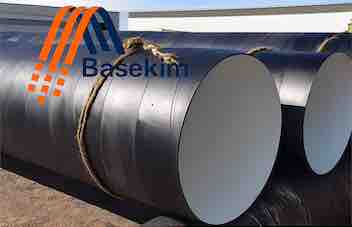Gilsonite is used in pipe coating due to its exceptional waterproofing, adhesion, and anti-corrosion properties. When blended with bitumen or other resins, Gilsonite enhances the coating’s hardness and resistance to chemicals, moisture, and temperature variations. This makes it ideal for protecting steel pipelines—especially those buried underground or exposed to harsh environments—by preventing rust, corrosion, and physical damage over time. Its natural bonding strength also ensures long-lasting adhesion to metal surfaces, reducing maintenance costs and extending pipeline life.
Physical & Chemical Specifications
Physical Properties
- Appearance: Black, brittle, and glossy
- Softening Point: 150–220°C (depending on grade)
- Moisture Content: <1%
- Specific Gravity: ~1.04
- Ash Content: 0.5% – 15% (based on application)
Chemical Composition
- Carbon: ~85%
- Hydrogen: ~10%
- Nitrogen, Sulfur, and Ash: Vary by grade
These specs make Gilsonite a premium candidate for enhancing the strength and durability of pipe coatings.
Grades of Gilsonite for Pipe Coating
- Select Grade: Best for high-performance anti-corrosion coatings
- Medium Grade: Cost-effective for general coating needs
- High-Ash Grade: Used when flexibility is needed more than hardness
Each grade is matched with specific bitumen ratios to fine-tune performance for your pipeline project.
Gilsonite Packaging Options
We offer multiple packaging formats to suit diverse logistics and application requirements:
- 25 kg multi-layer paper bags
- 500 kg jumbo bags
- 1 MT jumbo bags
- Customized private label bags
All packaging is moisture-proof and export-ready.
Applications in Pipe Coating Industry
Gilsonite is commonly applied in external pipeline coatings for oil, gas, and water transmission lines. It is typically blended with bitumen or synthetic resins to create a high-performance protective layer. The application methods include:
- Anti-corrosion coatings
- Enamel coatings
- Hot-applied pipe coatings
- Bitumen-based mastic
- Primer formulations for steel pipes
It’s widely applied in oil & gas pipelines, water distribution systems, and underground installations.
How to Use Gilsonite for Pipe Coating
- Preparation: Ensure the base bitumen is heated to 160–180°C.
- Blending: Slowly add Gilsonite flakes or powder and stir until fully dissolved.
- Application: Apply using brush, spray, or dipping methods.
- Curing: Allow proper curing time based on ambient conditions and coating thickness.
Advantages of Gilsonite in Coating Pipes
- High bond strength with steel and concrete
- Waterproof and moisture-resistant
- Superior UV resistance
- Enhanced abrasion and chemical resistance
- Eco-friendly and natural
Comparison with Other Coating Materials
Property | Gilsonite | Coal Tar | Epoxy |
Solvent Free | Yes | No | No |
Application Cost | Low | Medium | High |
Flexibility | High | Low | Medium |
Drying Time | Moderate | Slow | Fast |
UV Resistance | Excellent | Poor | Good |
Gilsonite stands out for its balanced performance and cost-efficiency.
Storage & Handling Guidelines
- Store in a cool, dry, and well-ventilated area
- Avoid direct sunlight and moisture exposure
- Use protective gear during mixing or heating
Safety Precautions
Though natural and non-toxic, precautions should be taken:
- Use gloves and eye protection during handling
- Avoid inhalation of fine powder
- Follow local disposal regulations
Environmental Impact
Gilsonite is a naturally sourced, non-toxic, and biodegradable hydrocarbon, making it a more sustainable option compared to synthetic coatings.
Global Supply Capability
As a leading Gilsonite supplier, we export directly from UAE, Iran, and Turkey to over 40 countries worldwide, with flexible packaging, competitive pricing, and timely delivery.
Why Choose Us as Your Gilsonite Supplier
- Direct-from-source pricing
- Custom formulation and packing
- High-quality control standards
- Technical support and consultation
- Reliable export logistics
FAQs
- What is the softening point of Gilsonite used in pipe coating?
It ranges from 150°C to 220°C depending on the grade. - Can Gilsonite be blended with bitumen directly?
Yes, just heat the bitumen and add Gilsonite slowly under stirring. - Is Gilsonite eco-friendly?
Absolutely! It’s naturally occurring and does not release harmful toxins. - What is the shelf life of Gilsonite?
When stored properly, it has an indefinite shelf life. - Can Gilsonite be used in water pipelines?
Yes, it’s excellent for waterproof and corrosion-resistant coatings.
